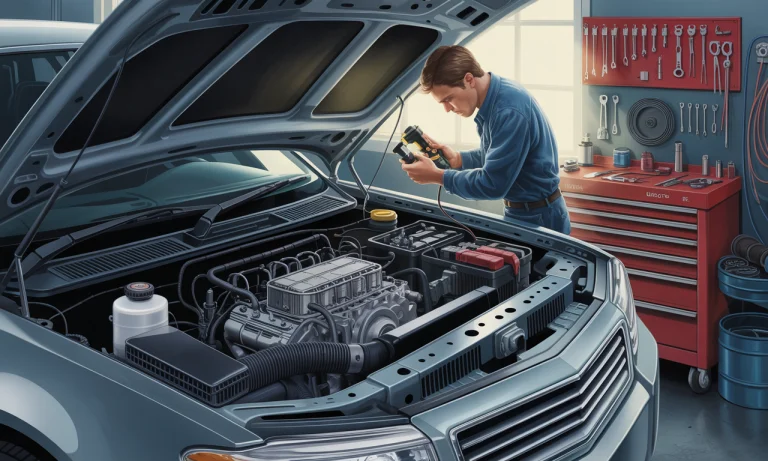Behind the hum of a well-running car lies a hidden world of moving parts, fragile systems, and untold stories. In the city’s early hours, when commuters rely on their vehicles for another day of work, most rarely question what keeps these engines purring. But it is not luck that wards off roadside mishaps or keeps costs manageable. For vehicle owners like Jake, who remembers that sharp jolt of a failed alternator on a freezing January, regular engine inspections are the foundation of confidence on every journey. It’s not just about compliance or ticking off a list–it’s about protecting your investment, safety, and peace of mind. With breakthroughs in diagnostics from the likes of Bosch and the unchanging need for thorough checks, the practice of routine engine inspections stands as a vital ritual for any responsible driver in 2025.
Why Regular Engine Inspections Are Critical for Vehicle Performance and Longevity
Every vehicle tells a silent tale with each mile added to its odometer. Those who heed these stories with attention save themselves headaches down the road. Routine engine inspections offer a revealing snapshot of a car’s overall health, catching leaks, identifying worn parts, and preventing hidden issues from escalating into expensive repairs. Brands like Castrol, Shell Helix, and Mobil 1 have long partnered with service centers, underlining how necessary oil quality and regular checks are for engine integrity.
Today, advanced diagnostic tools such as Snap-on and Autel ensure that even the most elusive engine knocks or sensor glitches are uncovered early. According to current best practices, drivers following recommended inspection intervals see their vehicles last well over a decade, retaining value and reliability. The relevance extends beyond convenience—well-maintained engines contribute to lower emissions and improved efficiency, echoing through the used car market as discussed in this comprehensive guide on car inspection steps. The stories of families avoiding breakdowns on cross-country trips illustrate how these inspections are woven into the fabric of daily safety and long-term savings.
| Inspection Aspect | Potential Issue Detected | Brand Examples |
|---|---|---|
| Oil Quality & Level | Sludge, Low Viscosity | Castrol, Shell Helix, Mobil 1 |
| Diagnostics Scan | Sensor Failures, Error Codes | Bosch, Snap-on, Autel |
| Spark Plug Condition | Misfires, Poor Combustion | NGK, Denso |
| Fluid Checks | Coolant Leaks, Low Brake Fluid | Valvoline |
How Regular Engine Inspections Prevent Unnecessary Repairs and Enhance Safety
Imagine a young couple, Lily and Max, setting out for their first road trip in a pre-owned sedan. Their anticipation masks the reality that, without routine engine checks, they may be unwittingly courting disaster. Inspections serve as a guardrail against such unpredictability, especially when performed by certified technicians equipped with tools like BlueDriver and Bosch scanners. Early detection of worn brake pads, corroded spark plugs, or failing batteries reduces the risk of sudden stalls or unsafe handling conditions.
Recent studies highlighted in spot hidden used car problems underscore how undiagnosed engine weaknesses often lead to costly breakdowns or even collisions. The correlation between timely maintenance and decreased emergency repairs is impossible to ignore. Each small investment in inspection returns peace of mind, whether for daily commutes or long-distance journeys.
Professional vs. DIY Engine Checks: What Every Car Owner Needs to Know
Some car enthusiasts, like Jake, take pride in popping the hood and checking fluid levels or spark plugs, relying on brands such as Valvoline or NGK. While DIY checks are invaluable for basic upkeep, they seldom match the comprehensiveness and precision of a certified technician’s inspection. Professionals follow strict guidelines—as outlined in resources like car engine basics—using specialist devices from Autel, Bosch, and Snap-on to diagnose nuanced issues invisible to the naked eye.
This difference is best illustrated through real-world data presented in the article on car engine maintenance tips. Here, vehicles subjected to periodic professional assessments saw a marked reduction in catastrophic engine failure, underscoring the advantage of specialized know-how and modern technology. Warranty terms from many manufacturers, including coverage guidelines, now hinge on service histories maintained by certified workshops—making scheduled inspections an obligation rather than a simple recommendation.
| Type of Check | Tools/Brands Commonly Used | Scope | Warranty Impact |
|---|---|---|---|
| DIY | NGK, Valvoline | Basic fluids, tire pressure | Limited |
| Professional | Bosch, Snap-on, Autel, BlueDriver | Comprehensive systems, sensors, codes | Manufacturer-Required |
Key Engine Inspection Checkpoints and Recommended Intervals
The roadmap to vehicle longevity begins with understanding what to inspect, when, and why. Comprehensive reviews tackle everything from engine oil—where brands like Castrol and Shell Helix prove their worth—to the minutiae of electrical systems and exhaust integrity. Delays may compromise not only wallet but safety, as emphasized in this detailed step-by-step inspection guide. Most manufacturers recommend biannual (once every six months) engine assessments, with additional checks preceding long-haul trips or after notable mileage milestones.
Consider the story of a taxi fleet in Paris that cut its engine failures by a third simply by adhering to a strict inspection protocol, supported by trusted brands like Denso for quality replacement parts. These facts paint a clear picture—proactivity beats crisis management every time, cementing regular inspections as a pillar of smart car ownership. For deeper insights, consult the leading causes of engine failure.
How Engine Inspections Protect Your Car’s Value and Your Wallet
No driver wants to find themselves negotiating a trade-in value only to learn that hidden mechanical faults erode their car’s worth. Regular engine checks document the care provided, shining in records and reassuring prospective buyers. Tools from Bosch and BlueDriver make detailed diagnostic histories accessible, leaving fewer questions at the negotiating table.
According to auto industry insiders and this resource on common car buying mistakes, buyers are increasingly scrutinizing inspection logs before committing. In 2025, as vehicle electrification and smart diagnostics flourish, a well-documented inspection history will stand out as your car’s most persuasive testament to reliability and performance. It’s a legacy of care that extends far beyond oil changes, investing in long-term value and trust.
| Benefit | Real-Life Scenario | Resource |
|---|---|---|
| Resale Value | Proven care during dealership trade-in | Common Mistakes |
| Reduced Major Repairs | Preventing engine failure with oil monitoring | Oil & Performance |
| Legal and Insurance Compliance | Claims supported by inspection logs | Maintenance Guide |
| Lower Environmental Impact | Emissions reduced by catching leaks early | Maintenance Tips |
Answers to Common Questions About Engine Inspections
How often should I schedule a professional engine inspection?
Most automotive experts recommend having your engine professionally inspected every six months, or before any extended road trip. If your car is showing changes in performance or reaching major mileage milestones, it’s wise to check in even sooner.
What are the signs that my engine needs immediate inspection?
Look out for warning lights on your dashboard, difficulty starting, unusual noises from under the hood, changes in fuel efficiency, or fluid leaks. If any of these appear, book an inspection right away.
Will regular inspections improve my car’s resale value?
Absolutely. Well-documented engine inspection histories indicate responsible ownership, making your vehicle more appealing and valuable during resale or trade-in negotiations.
Can I rely solely on DIY engine checks?
While DIY tasks like checking fluids or filters are useful, they cannot substitute for the depth and precision of a professional inspection using advanced tools from brands like Bosch, Autel, or Snap-on.
Which brands are associated with reliable engine maintenance?
Major names include Bosch, Castrol, Mobil 1, Shell Helix, Valvoline, Snap-on, Autel, Denso, NGK, and BlueDriver—all trusted for their expertise in diagnostics, lubricants, tools, and parts.
Did you like it? 4.6/5 (29)






